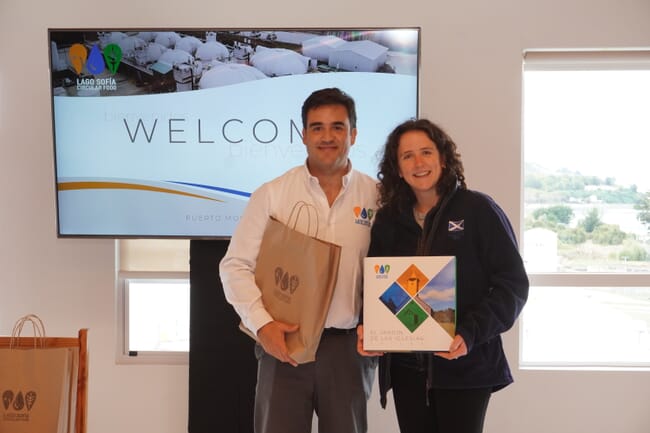
Gougeon, who was in Puerto Montt for the Aqua Sur trade show, toured Chinquihue – a land-based smolt farm owned by Lago Sofia. She was part of a delegation that also included the private secretary for rural affairs, Rahul Singh; the special advisor to the Scottish Ministers, Kate Higgins; the deputy director for marine economy and communities, Malcolm Pentland; and the head of aquaculture development, Jill Barber.
According to Goudgeon, it was interesting to see how this company operates and the investment it makes in animal health and welfare, as well as observing the importance they give to the community, both in the decisions they make and in the business they build.
She added that both environmental and social values are exactly what they are trying to implement in Scottish aquaculture.
“We published our vision for sustainable aquaculture last year because we want to see sustainable growth in this activity in our country, but we know that we need to do that by working with the environment that we have, trying to improve the environment, but also making sure that we are working with our communities too, because that is a really essential part of that process,” the minister said.
In turn, the CEO of Lago Sofia, Miguel Portus, commented that this visit became an excellent opportunity to present some of the contributions his company has made in terms of technology and design of their RAS modules.
“These systems have been known in the market for some time; here we could appreciate how from a high standard in sustainability and animal welfare, a smolt production project was assembled, which has become a benchmark within the country's fish farms. We feel very honored that Minister Gougeon has considered our facilities and has given us almost a full morning of her time,” he said.
Building bridges
Lago Sofia is part of the Blue Bridge programme, organised by the UK Department of Business and Trade, along with the British Embassy in Chile, which aims to promote opportunities in the UK for a group of Chilean companies supplying aquaculture technology.
“This opportunity allowed us not only to show Scottish authorities what we can bring to Scotland as part of our contributions to production systems but also opens up a world of possibilities for technological, academic, and production exchange in different areas of the farming cycle, and in this, I believe we have an important comparative advantage because the technology we use allows us to flexibilise production, maintain a high sanitary standard, and rigorously care for the welfare of the fish,” Portus said.
“We know that aquaculture is very important for our economy in Scotland. It provides well-paid jobs in some of the most remote areas of our country and also in our island communities. But, we know that industry growth needs to be sustainable. That means reducing environmental impact, investing in animal health and welfare, as well as working with communities, and that is exactly what we saw today at Lago Sofia,” Gougeon concluded.




